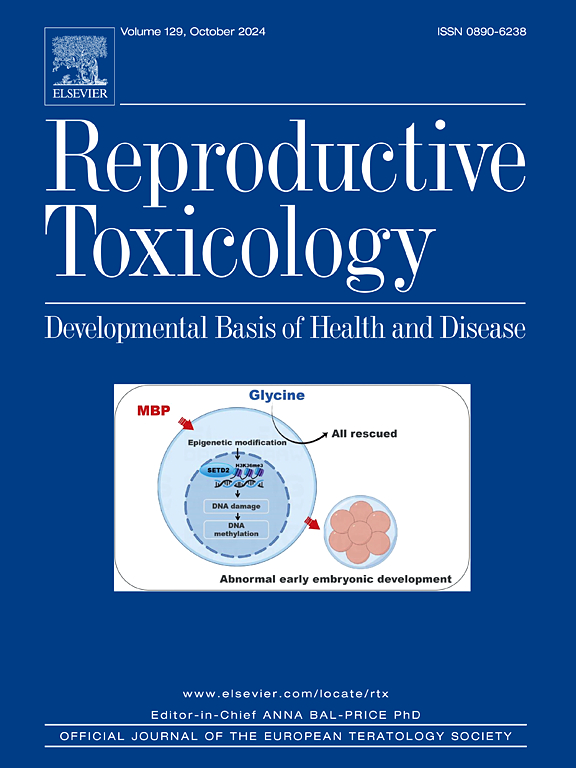关于 900 MHz 辐射对人类精子影响的初步研究:体外分子方法
IF 3.3
4区 医学
Q2 REPRODUCTIVE BIOLOGY
引用次数: 0
摘要
在全球范围内,产生和发射电磁场(EMF)技术的使用呈指数级增长。近十年来,人们利用体外和体内方法研究了移动电话和其他无线设备等电磁场辐射设备对生物的影响。不孕不育是一个日益严重的健康问题,近一半的病例是由于男性因素造成的。本研究调查了 900 MHz 辐射对健康正常无精子男性的精子参数、遗传状态、凋亡标志物和 PI3K/AKT 信号通路的直接体外影响。精液样本分为四组,两组为对照组(30 分钟和 1 小时),两组为暴露于电磁场组(30 分钟和 1 小时)。对精子参数(运动能力、渐进运动能力、顶体指数、形态)、遗传状态(DNA片段化和染色质完整性)、凋亡标志物(细胞因子-c和caspase-3表达)和PI3K/AKT信号通路(磷酸化亚硝基3-激酶-PI3K-和磷酸化AKT- p-AKT-)进行了分析。暴露于电磁场30分钟后,精子活力明显降低,而暴露于电磁场1小时后,p-AKT的表达明显增加。EMF组和对照组均未观察到精子空泡化、顶体缺陷、顶体下空间扩展、染色质结构不凝结、凋亡迹象和轴丝中断等现象。其他精子参数(形态和顶体指数)、遗传状态、凋亡标志物和 PI3K 表达率均无明显变化。本文章由计算机程序翻译,如有差异,请以英文原文为准。
Preliminary study on the impact of 900 MHz radiation on human sperm: An in vitro molecular approach
The use of technologies that produce and emit electromagnetic fields (EMF) is growing exponentially worldwide. The biological effects of EMF-emitting equipment, such as mobile phones and other wireless devices, have been studied in the last decade using in vitro and in vivo methods. Infertility is a growing health problem, and nearly half of cases are because of male-factor. This study investigated the direct in vitro effects of 900 MHz radiation exposure on sperm parameters, genetic status, apoptotic markers, and the PI3K/AKT signaling pathway in healthy normozoospermic men. Semen samples were divided into four groups, two control (30 min and 1 h) and two EMF exposure (30 min and 1 h). Sperm parameters (motility, progressive motility, acrosomal index, morphology), genetic status (DNA fragmentation and chromatin integrity), apoptotic markers (cytokine-c and caspase-3 expression) and the PI3K/AKT signaling pathway (phosphoinoitide 3-kinase-PI3K- and phosphorylated AKT- p-AKT-) were analysed. Sperm motility were significantly reduced in 30 min EMF exposure while a significant increase in the expression of p-AKT were observed in 1 h EMF exposure group. An increased vacuolisation, acrosomal defect, extension of subacrosomal space, uncondensed chromatin structure, apoptotic signs and disrupted axoneme were observed in both EMF groups which were not observed in the control group. Other sperm parameters (morphology and acrosomal index), genetic status, apoptotic markers and the PI3K expression rates had no significant change.
求助全文
通过发布文献求助,成功后即可免费获取论文全文。
去求助
来源期刊

Reproductive toxicology
生物-毒理学
CiteScore
6.50
自引率
3.00%
发文量
131
审稿时长
45 days
期刊介绍:
Drawing from a large number of disciplines, Reproductive Toxicology publishes timely, original research on the influence of chemical and physical agents on reproduction. Written by and for obstetricians, pediatricians, embryologists, teratologists, geneticists, toxicologists, andrologists, and others interested in detecting potential reproductive hazards, the journal is a forum for communication among researchers and practitioners. Articles focus on the application of in vitro, animal and clinical research to the practice of clinical medicine.
All aspects of reproduction are within the scope of Reproductive Toxicology, including the formation and maturation of male and female gametes, sexual function, the events surrounding the fusion of gametes and the development of the fertilized ovum, nourishment and transport of the conceptus within the genital tract, implantation, embryogenesis, intrauterine growth, placentation and placental function, parturition, lactation and neonatal survival. Adverse reproductive effects in males will be considered as significant as adverse effects occurring in females. To provide a balanced presentation of approaches, equal emphasis will be given to clinical and animal or in vitro work. Typical end points that will be studied by contributors include infertility, sexual dysfunction, spontaneous abortion, malformations, abnormal histogenesis, stillbirth, intrauterine growth retardation, prematurity, behavioral abnormalities, and perinatal mortality.
 求助内容:
求助内容: 应助结果提醒方式:
应助结果提醒方式:


